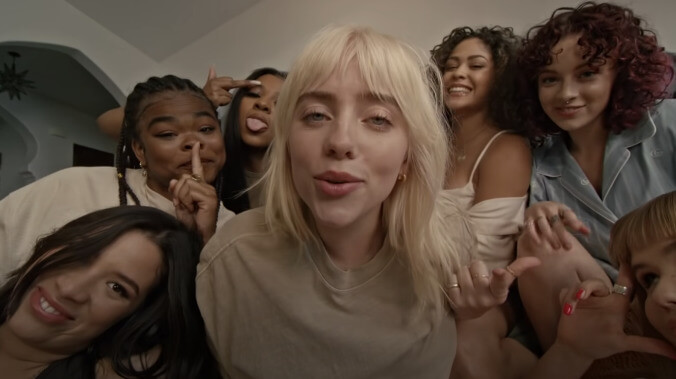Billie Eilish opens Happier Than Ever by one-upping Nirvana
"Getting Older" comments on musical fame in a manner so acid, it doesn't just match "Serve The Servants"—it does it one better by calling out the fans

After weeks of promotion (and some excellent singles), Billie Eilish’s sophomore album, Happier Than Ever, was released last night, and the early responses to it have been largely positive. Initial spins of the record quickly demonstrate why: This is a sharp, multilayered collection of pop songs, delivered in Eilish’s signature underplayed and quiet-but-intense style. But there’s no wisecracking opening bit here, no playful “I have taken out my Invisalign” from When We All Fall Asleep, Where Do We Go? to goose the listener before jumping into the music. Instead, the album kicks off with one of the slyest, most acid-tongued commentaries on the transition from pre- to post-superstardom life since “Serve The Servants” served as the lead-in to Nirvana’s In Utero back in 1993.
Most pop stars intentionally shy away from directly confronting the cost of fame in their music, for fear of coming across as unrelatable or losing the “I’m just like you” accessibility that brought them fame in the first place, preferring to address concerns of success more indirectly or thematically. From the Eagles’ “After The Thrill Is Gone” to Lady Gaga’s “Paparazzi,” a lot of the music that comments on the price of fame is deliberately crafted to allow listeners to substitute relationship woes or existential drama, the vagueness allowing anyone to swap in their own concerns. Ironically, that’s the very reason why songs like “Serve The Servants” feel so vital and true—the unvarnished reminder that this person is not like you, and has experienced something you will probably never go through, ends up more honest and confessional than the watered-down alternative.
“Serve The Servants” does this in one of the most direct and meta ways imaginable: “Teenage angst has paid off well / Now I’m bored and old,” sings Kurt Cobain, the very first lyrics on the band’s heavily anticipated follow-up to smash hit Nevermind. “Self-appointed judges judge / more than they have sold.” It was simultaneously a snide kiss-off to media critics of Nirvana and a wry, funny commentary on the bizarre fact of becoming world-famous for writing noisy rock songs. Rather than trying to draw in listeners with an inviting, “gather ’round, and let me sing you a song” attitude, Cobain was drawing a line in the sand; he’s essentially saying, “You’ve never been through what we have and you never will, so fuck off, you’re making this not fun.”
“Getting Older,” the opening track on Happier Than Ever, not only follows suit, it does Cobain one better: It directly calls out fans themselves, instead of just media figures and critics. At first, it seems like Eilish is going to deliver the sort of heartfelt, revealing confessional that made her seem so vulnerable on her first album: “I’m getting older, I think I’m aging well / I wish someone had told me I’d be doing this by myself.” It’s the kind of universal sentiment that cuts deep, and she continues in that vein with the second line, before dropping in a reference to her newfound fame: “There’s reasons that I’m thankful, there’s a lot I’m grateful for / but it’s different when a stranger’s always waiting at your door.” It’s a shift in the tone of the song, albeit still a tender, mournful one—but then, Eilish slides in the knife.
“Which is ironic, ’cuz the strangers seem to want me more than anyone before / Too bad they’re usually deranged.”
The song flips the entire script of the usual “you, the fans, keep me grounded” approach, turning from a rumination to a reprimand. It’s cutting, and caustic, and playful all at once—in other words, it’s exactly what’s great about Eilish and her music, a smart and sly way to kick off the first post-fame album. And she matches Cobain again, this time on the “bored and old” front: “Things I once enjoyed / just keep me employed, now.” The entire track runs the gamut of emotions, but always with a clear, gimlet-eyed look at the unusual position she’s in, and the double-edged nature of the acclaim she receives.
As second acts go, this one has a hell of an opening salvo; time will tell if the record holds up as well or better than her debut, but Eilish is already one step ahead on that front, too: “It’s so weird, that we care so much—until we don’t.”